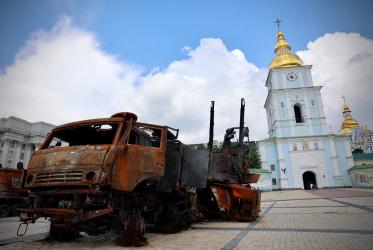He shall judge between many peoples,
and shall arbitrate between strong nations far away;
they shall beat their swords into ploughshares,
and their spears into pruning-hooks;
nation shall not lift up sword against nation,
neither shall they learn war any more;
but they shall all sit under their own vines and under their own fig trees,
and no one shall make them afraid
(Micah 4:3-4)
Following the first ecumenical roundtable meeting on 30 March 2022, a second ecumenical roundtable meeting on the war in Ukraine was convened on 10 June 2022 in Bossey, Switzerland, upon the invitation of the acting general secretary of the World Council of Churches (WCC).
Senior representatives of WCC member churches from several European countries neighbouring and directly affected by the current conflict gathered to consult each other on relevant developments since the first roundtable meeting, and to discuss appropriate responses by the ecumenical movement, including in the context of the forthcoming WCC 11th Assembly in Karlsruhe, Germany, on 31 August-8 September 2022.
With very deep sadness and regret, we again missed the presence of representatives of the Russian Orthodox Church, due to very recent changes in the hierarchy of the Moscow Patriarchate, which had however been committed to taking part in our gathering. Obviously, the absence of these key counterparts constituted a fundamental obstacle to the purpose for which we convened – that of dialogue and mutual consultation.
We participants in this second meeting strongly reaffirm the joint ecumenical position expressed by the participants in the first roundtable meeting, especially the rejection of war as against the will of God, and of the use of deadly military force as a means of resolving disputes – in Ukraine or elsewhere. We reiterate our denunciation of the unjustified and illegal military aggression launched by the leadership of the Russian Federation against the people of the sovereign state of Ukraine. We call again for an immediate ceasefire and for dialogue and negotiations as the only morally acceptable path forward.
In addition to the terrible suffering of the people of Ukraine and the loss of precious lives on both sides, we also lift up again the consequences of this unjustifiable war for the poor and vulnerable of the entire world, especially due to the escalating global food crisis and the accelerating trajectory towards climate catastrophe driven by the effects of this conflict.
Despite the absence of our dialogue partners from Russia in this meeting, we re-emphasize the critical importance of the WCC as a platform for encounter and dialogue among the churches and communities most directly impacted by this war. This is the key and unique contribution that the global ecumenical movement can bring to the peaceful resolution of this crisis for which we all hope and pray. The calling to dialogue, encounter, and the pursuit of mutual understanding is the very essence of ecumenism. Division and exclusion is the antithesis of the purpose of our movement.
Nevertheless, we strongly reject the apparent instrumentalization of religious language by political and church leaders to support an armed invasion of a sovereign country. We cannot see this as anything other than fundamentally contradictory to our common understanding of core Christian and ecumenical principles. And for that reason, dialogue on the basis of truth and love is essential. It is urgently necessary to help turn the tide of division, confrontation and conflict, and to help heal the deep wounds created in the global community by this brutal ongoing war.
We pray that the WCC 11th Assembly and its theme – Christ’s love moves the world to reconciliation and unity – can provide both inspiration and momentum for the peace, reconciliation and healing for which we yearn, and we ask the leadership of the WCC and its central committee to consider ways in which the assembly can most effectively serve this critical need.
Dr Agnes Abuom
World Council of Churches
Bishop Zoltán Balog
Reformed Church in Hungary
Bishop Dr Heinrich Bedford-Strohm
Evangelical Church in Germany
Archbishop Dr Antje Jackelén
Church of Sweden
Rev. Dr Kimmo Kääriäinen
Evangelical Lutheran Church of Finland
H.E. Archbishop of Prague and Czech Lands Michal
Orthodox Church in the Czech Lands and Slovakia
Bishop Peter Mihoc
Evangelical Church of the Augsburg Confession in Slovakia
Rev. Prof. Dr Ioan Sauca
World Council of Churches acting general secretary (convener)
H.E. Metropolitan Prof. Dr Nifon of Targoviste
Romanian Orthodox Church
Rt Rev. Dr Olav Fykse Tveit
Church of Norway
Archbishop Urmas Viilma
Estonian Evangelical Lutheran Church
Fr Jan Beranek
Orthodox Church in the Czech Lands and Slovakia (interpreter)
WCC staff
Marianne Ejdersten
Director Communication
Peter Prove
Director, Commission of the Churches on International Affairs
Diana Chabloz
Assistant to the Acting General Secretary





